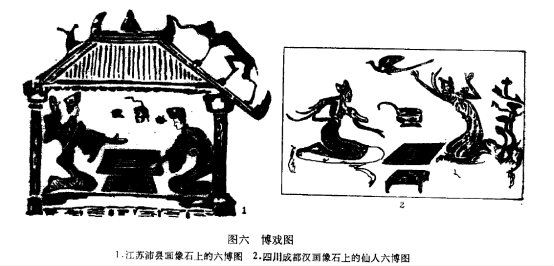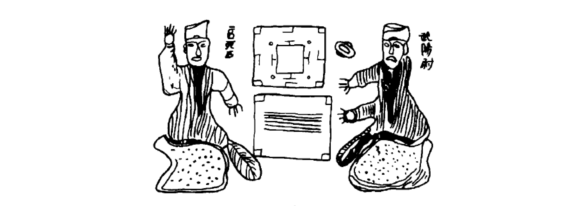Lacquered Liubo chess set

Overall Height 17cm, Length 45 cm, Width 45cm
Excavated from Han Tomb No.3, Mawangdui, Changsha city,
Hunan Province, 1973
This Liubo chess set includes the most complete set of pieces for this game that has ever been excavated. The box is coated with black lacquer outside and cinnabar lacquer insides, its cover is incised with the designs of flying birds, floating clouds and geometric patterns. Inside the box are a chessboard, various black and white pieces, 12 long chips, 30 short chips as well as one carving knife made of horn, one sharpening knife and a wooden dice, ball-shaped with 18 facets carved in intaglio with the Chinese characters ‘jiao’ (a favorable move) and ‘qi-wei’ (an unfavorable move) and the numerals from 1 to 16. Liubo chess, a game of victory or failure and gains or losses, came into existence in the Spring and Autumn period, and the Qin and Han dynasties. As for the rules of the game, two persons take turns to throw the dice to determine the moves of game pieces. By so doing, one moves his piece in order to win chips from his opponent. The one who earns more chips from the other is regarded as a winner.
深入探索
History of Bo in China
Bo is an ancient game of victory or failure and gains or losses. Already in existence before the Qin Dynasty, it became extremely popular during the Han Dynasty. According to archaeological excavation reports, among the more than 30 unearthed ancient bo real objects (including burial objects), seven of them come from tombs of the Warring States Period and Qin Dynasty, and over twenty from tombs of the two Han Dynasties.
The game of bo originated very early in China. Records of the Grand Scribe: The True Records of Yin says: “Emperor Wuyi was a man of no moral standards. He created a wooden figure and named it Heavenly God. He played bo with it and punished it when it failed to win the game.” From this we can see that bo appeared in the Shang Dynasty at the latest. The game of bo had become a popular entertainment activity of the people between the Spring and Autumn Period and the Warring States Period. Records of the Warring States: Records of the State of Qi records: “The land of Linzi is very wealthy and the people there all play yu (mouth organ) and se (25-stringed zither) …… and play the game of bo.” Records of the Grand Scribe: The Book of Entertainers also records: “If it happens to be a countryside gathering, men and women would sit mixed, drinking and playing the game of bo. They would shake hands to avoid punishment and staring in the eyes of other people is not forbidden.” From this we can imagine how noisy and excited the scene of playing bo was during the Warring States Period.
The game of bo became even more popular in the Han Dynasty. From the emperor and high court officials to the populace, everybody was a super fan of it. Some people were even so infatuated by it that “they abandon their pursuit and forget eating and sleeping”. According to historical records, Emperors Wendi, Jingdi, Wudi, Zhaodi and Xuandi were all enthusiasts of the game of bo. That the highest rulers loved this game increased the popularity of bo in the society, and people good at this game not only were highly respected by others but also enjoyed relatively high social status. Before the Qin Dynasty, the game of bo was an entertainment activity restricted to men only. By the Han Dynasty, women also began playing it and some even had sets of this chess game in their dowry. During the reign of Han Emperor Xuandi, when the King of Jiangdu was marrying his daughter to Wusun Kunmo, the emperor bestowed the newly-weds a set of bo chess. People at the time loved the game of bo so much that they even thought the heavenly gods also loved it as they did, so bo chess was prepared during sacrificial ceremonies. Official History of Han Dynasty records: in the fourth year of Jianping Reign of Emperor Aidi, “People of the capital gathered in streets and lanes, laid out sets of bo chess, sang and danced to praise Queen Mother of the Western Heavens.” This gives one a glimpse of how much people of the Han Dynasty loved the game of bo.

Liubo game picture on the engraved picture stones, Pei County, Jiangsu Province.

Liubo game picture on the engraved picture stones, Xihukou, Teng County, Shandong Province.

Liubo game picture on the engraved picture stones, Chengdu, Sichuan Province.



